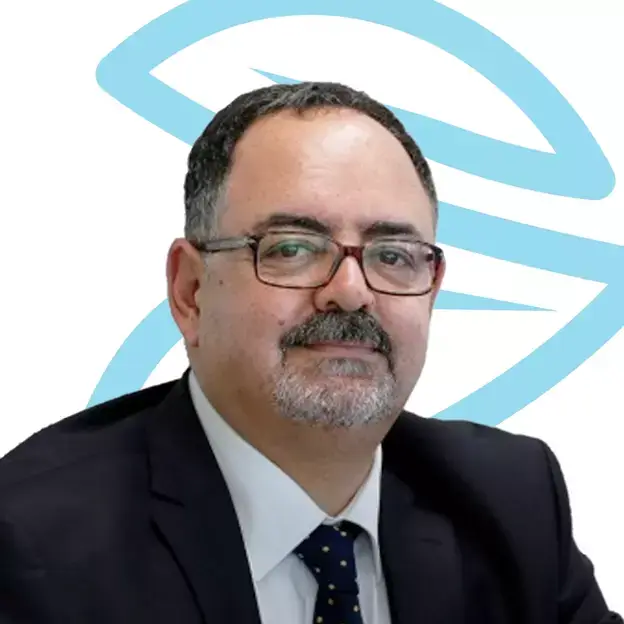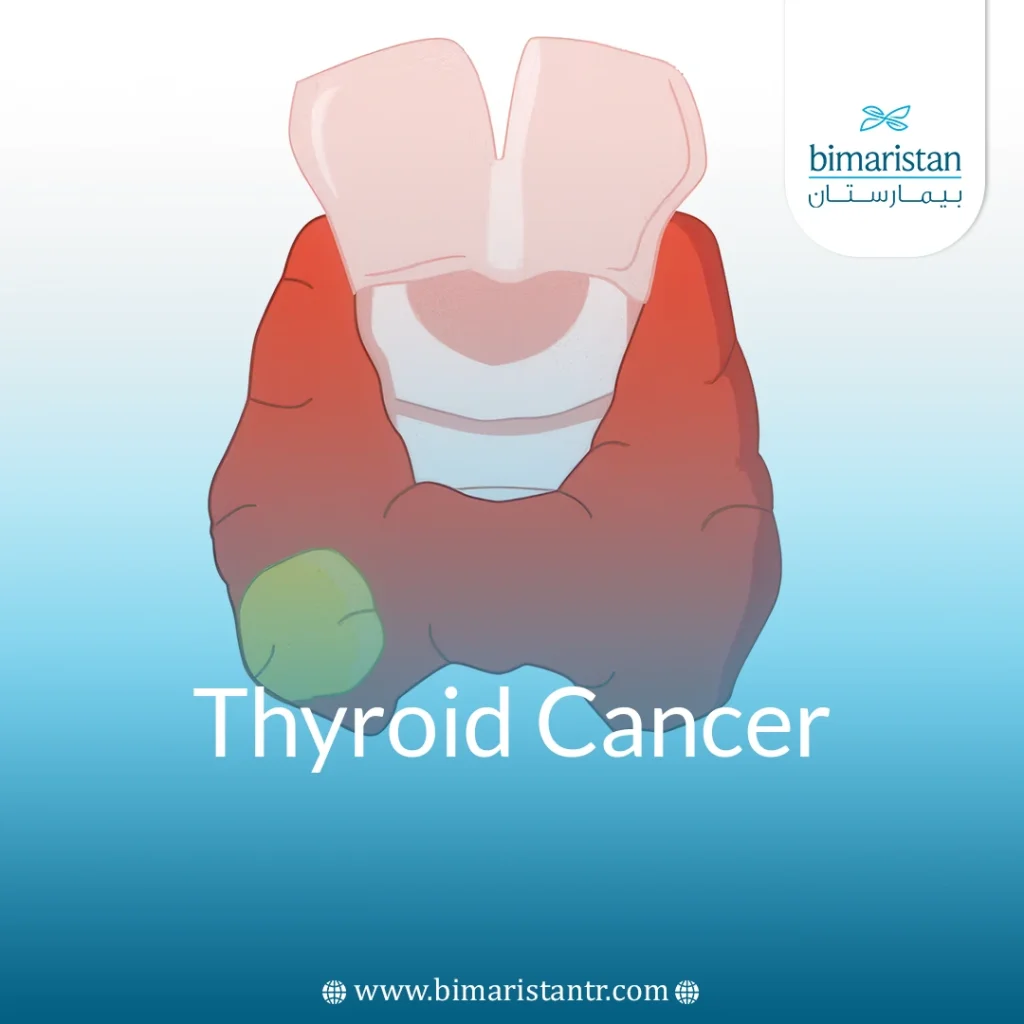Thyroid cancer affects the thyroid gland, located in the neck, which is part of the endocrine system responsible for regulating bodily functions. Treatment for thyroid cancer is available in Turkey.
Papillary and follicular thyroid cancers – the most common types – respond very well to treatments, and most thyroid cancers are highly curable.
What is thyroid cancer?
This cancer develops in the thyroid gland, a small butterfly-shaped gland located at the base of your neck, which is responsible for producing hormones that regulate your metabolism (the process by which your body uses energy).
Thyroid hormones also help control body temperature, blood pressure, and heart rate.
This cancer, a type of endocrine cancer, is generally highly treatable with an excellent cure rate.
What is the thyroid gland?
One of the many glands that make up the endocrine system, endocrine glands secrete hormones that control various body functions.
The pituitary gland in the brain controls the thyroid and other endocrine glands.
The pituitary gland releases thyroid-stimulating hormone (TSH), which stimulates the thyroid gland to produce its own hormones.
The thyroid gland needs iodine (a mineral) to make these hormones. Foods rich in iodine include fish, tuna, dairy products, whole-grain breads, and iodized salt.
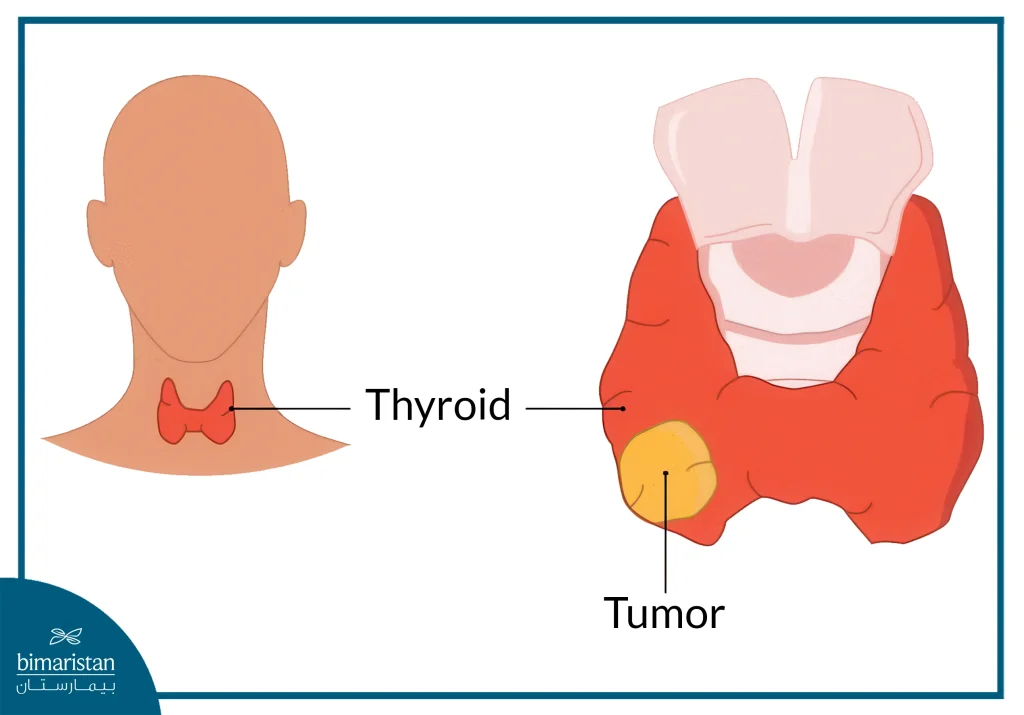
Where is the thyroid gland located?
Located at the base of the neck, in front of the trachea and below the Adam’s apple, the thumb-sized thyroid gland is shaped like a butterfly. A bridge of tissue connects the left and right lobes of the gland.
How common is thyroid cancer?
Approximately 53,000 Americans are diagnosed with this cancer each year, and treatments for most thyroid cancers are highly successful.
Yet about 2,000 people die from the disease each year.
What are the risk factors for thyroid cancer?
Women are three times more likely to develop this cancer than men.
The disease is most commonly diagnosed in women in their 40s and 50s and men in their 60s and 70s. Even children can develop the disease; risk factors include:
- Enlarged thyroid gland
- Family history of thyroid disease and/or this cancer
- Inflammation of the thyroid gland
- Gene mutations (changes) that cause endocrine diseases, such as multiple endocrine neoplasia type 2A (MEN2A) or multiple endocrine neoplasia type 2B (MEN2 B) syndrome
- Lack of iodine intake
- Obesity (high body mass index)
- Exposure to radiation therapy for head and neck cancer, especially in childhood
- Exposure to radiation from nuclear weapons
What are the types of thyroid cancer?
Thyroid cancer is categorized based on the type of cells from which the tumor grows; Types include the following:
- Papillary: Making up 80% of all these cancers, this type of cancer grows slowly. Although papillary thyroid cancer often spreads to the lymph nodes in the neck, the disease responds well to treatment.
Papillary thyroid tumor is highly curable and rarely fatal. - Follicular: Follicular thyroid tumor accounts for about 15% of thyroid cancers. This cancer is more likely to spread to the bones and lungs. Metastatic cancer (cancer that has spread) can be more difficult to treat.
- Medullary: Occurs in about 2% of thyroid cancers, a quarter of people with it have a family history of the disease, and it may be caused by a defective gene (genetic mutation).
- Aggressive: It is the most difficult type of thyroid cancer to treat. It can grow rapidly and often spread to surrounding tissues and other parts of the body. This rare type of cancer makes up about 2% of thyroid cancers.
What causes thyroid cancer?
Experts are unsure why some cells become cancerous (malignant) and attack the thyroid gland. Factors such as radiation exposure, a diet low in iodine, and defective genes can increase the risk.
What are the symptoms of thyroid cancer?
You may feel a lump or growth in your neck called a thyroid nodule. Don’t panic if you have a thyroid nodule. Most nodules are benign (not cancerous). Only about three out of every 20 thyroid nodules turn out to be cancerous (malignant).
Other signs include:
- Difficulty breathing or swallowing.
- Loss of voice (hoarseness).
- Swollen lymph nodes in the neck.
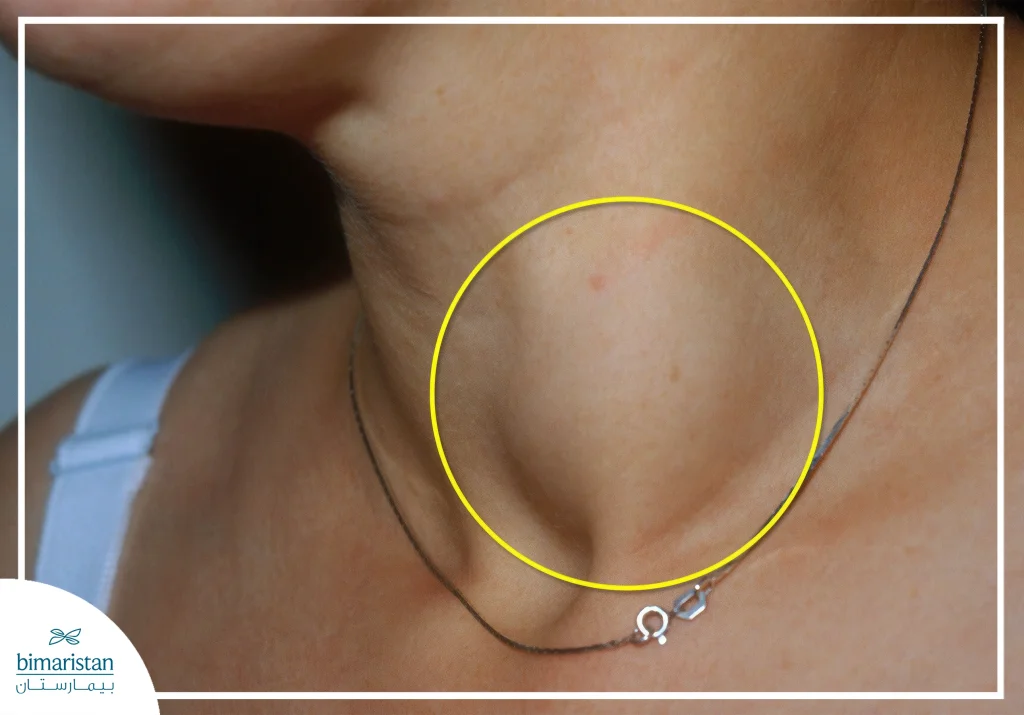
How is thyroid cancer diagnosed in Turkey?
If you have an enlarged thyroid nodule or other signs, your doctor may order one or more of these tests:
- Blood tests: A blood test shows the hormone levels produced by the thyroid gland and measures whether it is functioning properly.
- Biopsy: During a fine-needle biopsy, your doctor removes cells from your thyroid gland to look for cancer cells.
A lymph node biopsy can determine whether cancer cells have spread to the nodes. Your doctor may use an ultrasound to guide these biopsy procedures. - Radioactive iodine scan: This test can detect and determine if the cancer has spread. The patient swallows a pill containing a safe amount of radioactive iodine over a few hours; the thyroid gland absorbs the iodine. The doctor uses a special device to measure the amount of radiation in the gland; areas with less radioactivity need further testing to confirm the presence of cancer.
- Imaging examinations: Magnetic resonance imaging (MRI), computed tomography (CT), and positron emission tomography (PET) can detect the cancer and the spread of the cancer.
How is thyroid cancer treated or cured in Turkey?
Treatments depend on the size of the tumor and whether the cancer has spread. Treatments include:
Surgery:
Surgery is the most common treatment for thyroid cancer. Depending on the size and location of the tumor, the surgeon may remove part of the thyroid gland (lobectomy) or the entire gland (thyroidectomy). The surgeon also removes any nearby lymph nodes where the cancer cells have spread.
-
Radioactive iodine therapy:
With radioactive iodine therapy, you swallow a pill or liquid that contains a higher dose of radioactive iodine than is used in a diagnostic radioactive iodine scan. Radioactive iodine destroys the diseased thyroid gland along with the cancer cells. Don’t worry – this treatment is very safe. Almost all of the radioactive iodine is absorbed by the thyroid gland. The rest of the body has minimal exposure to radiation.
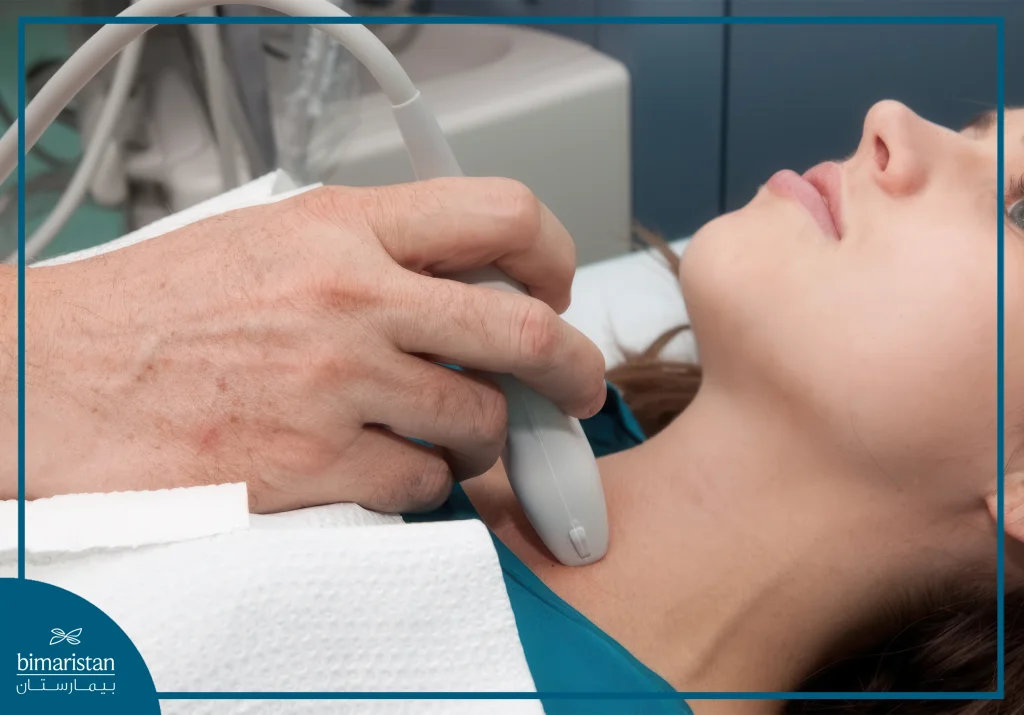
-
Radiation therapy:
Radiation kills cancer cells and prevents them from growing. External beam radiation therapy uses a machine to deliver powerful beams of energy directly to the tumor site, and internal radiation therapy (brachytherapy) involves placing radioactive seeds in or around the tumor.
-
Chemotherapy:
Intravenous or oral chemotherapy drugs kill cancer cells and stop cancer growth. Very few patients diagnosed with this cancer will need chemotherapy.
-
Hormone therapy:
This treatment prevents the release of hormones that can cause the cancer to spread or return.
What are the complications of thyroid cancer?
Most of these cancers respond well to treatment and are not life-threatening.
After thyroid surgery or treatments, your body still needs thyroid hormones, and you’ll need thyroid hormone replacement therapy for life.
Synthetic thyroid hormones, such as levothyroxine (Synthroid), take on the role of natural thyroid hormones that the body no longer produces after treatment.
How does thyroid cancer affect pregnancy?
Thyroid cancer is the second most common cancer diagnosed in pregnant women (breast cancer is the first). Approximately 10% of thyroid cancers occur during pregnancy or within the first year after birth. Experts believe that fluctuating hormone levels during pregnancy may lead to cancer.
If you’re diagnosed with this cancer during pregnancy, your doctor can discuss treatment options.
Depending on the type and severity of the cancer, your doctor may recommend postponing treatment until after your baby is born. If postponement isn’t possible, most women can safely undergo surgery to remove the cancerous gland. You shouldn’t undergo radiation diagnostic tests or radiation treatments during pregnancy or breastfeeding.
How can I prevent thyroid cancer?
Many people develop thyroid cancer for no known reason, so it’s not really preventable. But if you know you’re at risk of thyroid cancer, you may be able to take the following steps:
-
Preventive surgery:
Genetic testing can determine whether you carry an altered gene (mutation) that increases your risk of medullary thyroid cancer or multiple endocrine tumors. If you have the defective gene, you may choose to have preventive surgery to remove your thyroid gland before cancer develops.
-
Potassium iodide:
If you were exposed to radiation during a nuclear disaster, such as the Fukushima accident in Japan, taking potassium iodide within 24 hours of exposure can reduce your risk of eventually developing this cancer. Potassium iodide (Pima) prevents the thyroid gland from absorbing excessive radioactive iodine. As a result, the gland remains healthy.
When should I call my doctor?
You should contact your healthcare provider if you have this cancer and experience:
- Enlarged neck.
- Rapid heart rate.
- Unexplained weight loss or gain.
- Severe fatigue.
What questions should I ask my doctor?
If you have thyroid cancer, you may want to ask your healthcare provider:
- Why did I get thyroid cancer?
- What type of thyroid cancer do I have?
- Has the cancer spread beyond the thyroid gland?
- What is the best treatment for this type?
- What are the treatment risks and side effects?
- Will I need thyroid replacement hormone therapy?
- Is my family at risk for this type of thyroid cancer? If so, should we get genetic testing?
- Could I get the cancer again?
- Am I at risk for other types of cancer?
- What kind of follow-up care do I need after treatment?
- Should I watch for complications?
Receiving a cancer diagnosis is unsettling, regardless of the type. Fortunately, most thyroid cancers respond very well to treatment.
Your healthcare provider can discuss the best treatment option for your type of thyroid cancer. After treatment, you may need to take synthetic thyroid hormones for life.
These hormones support vital body functions. They usually don’t cause any major side effects, but you’ll have regular checkups to monitor your health.
Sources:
American Thyroid Association. (n.d.). Thyroid cancer. American Thyroid Association.
MD Anderson Cancer Center. (n.d.). Thyroid cancer. MD Anderson Cancer Center.
